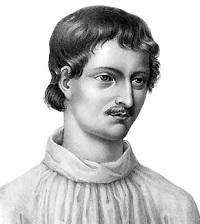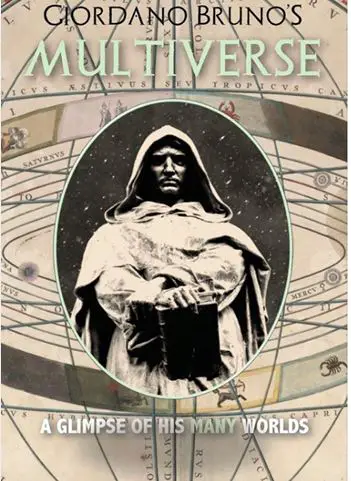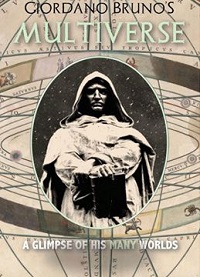|
TRANSLATE THIS ARTICLE
Integral World: Exploring Theories of Everything
An independent forum for a critical discussion of the integral philosophy of Ken Wilber
 David Christopher Lane, Ph.D.
Professor of Philosophy, Mt. San Antonio College Lecturer in Religious Studies, California State University, Long Beach Author of Exposing Cults: When the Skeptical Mind Confronts the Mystical (New York and London: Garland Publishers, 1994) and The Radhasoami Tradition: A Critical History of Guru Succession (New York and London: Garland Publishers, 1992). David Christopher Lane, Ph.D.
Professor of Philosophy, Mt. San Antonio College Lecturer in Religious Studies, California State University, Long Beach Author of Exposing Cults: When the Skeptical Mind Confronts the Mystical (New York and London: Garland Publishers, 1994) and The Radhasoami Tradition: A Critical History of Guru Succession (New York and London: Garland Publishers, 1992).SEE MORE ESSAYS WRITTEN BY DAVID LANE Giordano Bruno’s MultiverseA Glimpse of His Many WorldsPrefaceDavid Lane
Bruno has taught us that being skeptical is more important than blindly believing. He died exemplifying that truth.
I was raised in a relatively strict Roman Catholic household. I received Holy Communion at seven years old after giving my first official confession in front of a priest in a small, darkened cubicle. Later at the age of thirteen I was formally “Confirmed,” choosing “Xavier” as my saint's name. I attended Catholic schools for eleven years and even taught Religious Studies for five years at three different high schools (Moreau High School, Chaminade College Preparatory, and the University of San Diego, H.S.). From birth I was deeply indoctrinated into Christian ideas and was trained by a variety of nuns, priests, and brothers. We were taught that Roman Catholicism was the one true Church with a direct lineage connection to Jesus Christ through his disciple, Peter. Those who questioned or doubted the Catholic faith were regarded as heretics and because of their contrarian views would end up suffering in the afterlife for their apostasy. I distinctly remember in first grade being taught about heaven and hell and the differences between venal and mortal sins. Sister Susan drew on the board a large circle saying it represented our soul and she filled it in with chalk, which I think she claimed was the grace and mercy of the Lord. However, every time we commit a venal sin (we understood “venal” to mean a small lapse, like lying to one's mother about why we didn't take the trash out) we lose some of God's grace. The sister then proceeded to erase a little section in the circle. If we do something really bad, though, then all the grace is eliminated and if we die before confessing our sins to God, then we have committed our soul to hell. She then erased everything within the circle. A complete wipeout, we thought to ourselves. Hence, she explained, that is why it is called a mortal sin, since it kills our spiritual afterlife. I took this lesson very seriously and started having some truly frightful nightmares about hell and had trouble sleeping many nights. We were being encouraged to be “believers” at all costs, since doubt and disbelief meant that we were siding with the dark one, Satan and his minions. As I matured I got so disgusted with this type of cultic thinking that I began seriously questioning the myopic views of my more orthodox religion teachers. Once, I remember getting in trouble with Father Costello, a Dominican priest, because I had the audacity to ask if he had ever considered looking for the bones of Jesus Christ since I doubted the resurrection story he told us, particularly given the numerous contradictions in the four gospels when they are read laterally. Eventually I got kicked out of Notre Dame high school at the end of my junior year because my philosophical views were considered heterodox and I was having an undue influence on other students with my way of thinking. As the Vice-Principal at the time told me personally, “You are not a Notre Dame man.” I was devastated when I heard the news that I was being booted from the school, especially since I had only one more year before graduating. My parents and friends were also shocked, since I was not taking drugs, getting into fights, or any other kind of mischief that was the usual basis for being dismissed. Ironically, just six years later, this same Catholic administrator, who had disparaged my “liberal” beliefs, traveled up to Moreau High School in Hayward, where I was teaching and came into my classroom and in his own way apologized for what happened to me. Why he changed his tune I don't know, except that I learned later that he left the priesthood in order to live with his boyfriend in the San Fernando Valley.  Giordano Bruno What happened to me in the early 1970s was not an uncommon occurrence, since others I knew were also given the boot for their non-conformist ways. Traditional religions have a history of being intolerant of those who are freethinkers. Yet, all of this pales in comparison to what happened to heretics in the 16th century who dared to think for themselves and hold doctrines contrarian to the Church. Many not only got excommunicated, they also got executed in truly barbaric ways. Giordano Bruno (1548-1600) is perhaps the most infamous example of how horrific the Roman Catholic Church has been to those who disagree with its theological views. Bruno was by any measure a genuinely remarkable thinker in his own right and far ahead of his time in speculating about the vastness of the universe and our relationship with it. It is almost unimaginable that a religion, which is supposedly based on God's love and mercy, could have acted so blindly and so cruelly to those who would dare to think differently. It is one thing to get kicked out of an educational institute for being a skeptic, quite another to be burned at the stake for positing an alternative worldview. Of course the hypocrisy of the Catholic Church hasn't disappeared even in our more enlightened age of the 21st century. How else can one rationally justify that a Catholic priest can systematically rape children and yet still be allowed to conduct masses and give communion, even though a woman or man who is divorced cannot receive the same sacrament. [Thankfully, the current Pope Francis has loosened this prohibition, even though one still needs to consult with a Catholic priest first.] When it comes to fundamentalist beliefs clear reasoning and logic doesn't usually hold sway. The Roman Catholic Church has a massively tainted history and it is important, I believe, to fully understand how and why it has acted so ghastly over the centuries. A good place to start, I would suggest, is to closely examine the life and work of Giordano Bruno and witness how he was treated. It is an invaluable lesson in seeing how far cultic thinking can corrupt human souls who in their delusion believe they are advancing truth by persecuting and killing those who question and doubt their authority. L. Williams in translating Giordano Bruno's Gli Eroici Furori (“Heroic Enthusiasts”), from the original Italian into English back in 1887 and 1889, has done a great service to humanity. His introduction is especially illuminating as it contextualizes Bruno's life until his tragic death at the age of 52 and provides us with a tantalizing glimpse into his cosmological philosophy. It is my hope that this small book, which is drawn exclusively from Williams' work, will serve as an intellectual appetizer and lead to a deeper plunge into Bruno's fascinating thought. Giordano Bruno embodies what Peter Berger terms the “heretical imperative,” a clarion call for human beings to question authority and be willing to think for him or herself instead of following the status quo. Bruno stands out as an intellectual hero who deserves to be heard more now than ever before. Roman Catholicism owes a huge debt to Bruno and one that it has yet to fulfill. As the radical founders of the United States realized better than most: “To have freedom of religion, one must have freedom from religion.” Bruno has taught us that being skeptical is more important than blindly believing. He died exemplifying that truth.  |
